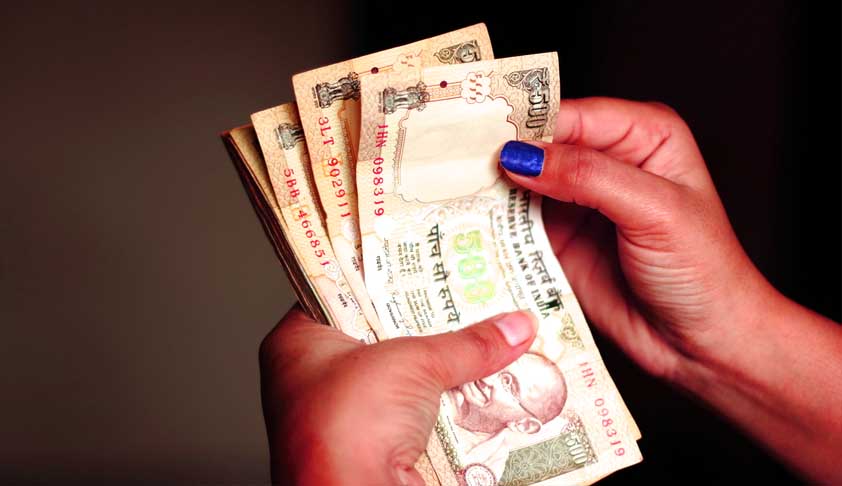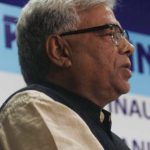Post-Demonetisation India: An Overview And Plea For Presidential Intervention
Ashok Panda
18 Dec 2016 10:51 AM IST

- This presentation is made not with a critical attitude towards the government policy on demonetisation, rather with a constructive idea to improve upon the situations resulting from the recent steps taken in pursuance of the policy of demonetisation. With my experience as a counsel practicing in the Supreme Court for the past 40 years, I appreciate the policy as an acceptable method to tackle the issue of black money and corruption. I sincerely wish the policy to succeed, and I am of the view that for the policy to be effective, further corrective measures are essential and should be pursued. The problem facing the country in reality is that of black economy and black incomes and not black money as popularly understood. The policy, it is to be emphasised, does little to tackle the black economy. Black economy is not the same thing as cash.
- It is of interest to note that before the Supreme Court, various issues pertaining to corruption and black economy are pending consideration. However, issues are raised in different cases, before different benches. For example, on the issue of black money deposited in foreign banks by Indian citizens, Mr. Ram Jethmalani has filed a writ petition, which has led to the constitution of Special Investigation Team (SIT) by the Supreme Court. The issue of Non-Performing Assets (NPAs) in the banking sector has been raised by the Centre for Public Interest Litigation (CPIL).The current group of cases challenging the policy of demonetisation is also on the docket of the apex Court. This has led to a situation, where the Supreme Court have not been able to take a comprehensive view on the entire spectrum of issues. A specific instance of concern is, though the SIT headed by two retired judges of the Supreme Court is submitting reports from time to time, the contents thereof are not in public domain. As a result, the public is not aware of the progress made in different cases that are being handled by the SIT. Ideally, the Court while accepting the reports should indicate the progress made by the SIT in individual cases.
- The entire policy of demonetisation is to be viewed against the aforesaid background. The fear is that the policy is at the risk of disruption in case the administration fails to bring about political consensus in support of the policy. Political confrontation not only results in complications in implementation of the present policy, it would also cause collateral damage to the ongoing process of GST. It is common knowledge that the proposed GST has been designed after an arduous process in building consensus among the entire political spectrum. However, the entire benefits which should have accrued to the national economy because of the introduction of GST is facing the risk of negation, because of the current political atmosphere. More than that, two complicated policies cannot be simultaneously implemented given our weak administration.
- The policy of demonetisation has put the entire country into deep turmoil since the aftereffects of the said policy were not seriously understood. The administration did not prepare itself to take necessary steps to alleviate the miseries of different segments of people, resulting from the policy.
- Major impact has been on the rural sector, wherein the reach of the banking organizations are minimal and inadequate. Added to this, the rural cooperative banks are kept out of the entire gamut, on the plea that their inclusion would result in further generation of black money along with other corrupt practices. As a result, vast segments of the rural population who constitute about 70% of the country’s population have been pushed to the dark ages of barter economy. This gravely affects the agricultural sector and the village based industries. Resultantly, food security in the country as well as the employment opportunities in the rural sector, are being drastically affected. This also creates a sense of deep alienation among the rural population, who feel that they are totally irrelevant for the policy makers and that their cause has been completely ignored by the central administration.
- The immediate impact of demonetisation are:
- the economy is contracting at an alarming speed;
- the manufacturing sector as well as employment opportunities in others are severely affected.
- the informal sector, which includes retail trade and business, vending of fruits and vegetables, repair and maintenance works of house and buildings etc., mainly depend on cash transactions. This sector is responsible for job creation primarily for the unskilled labour. Demonetisation without due preparation has severely affected the informal sector, bringing down employment opportunities for a vast segment of the population.
- Honest tax payers are being constantly harassed for withdrawal of their own money since banks do not have sufficient cash reserves. The restrictions, which the administration may characterise to be temporary, on the operation of the bank accounts by honest tax payers are without any legal sanction. Such restrictions on the freedom of operating banking accounts are absolutely unprecedented and we cannot find practice of such restrictions by any government anywhere in the world.
- After all the steps that have been taken by the administration, it seems that the following core issues with regard to black money have been left unattended:
- Deposits by the Indians in foreign banks, both legal as well as illegal are left untouched. Till date, the Special Investigation Team constituted by the Supreme Court has not come out in public domain, with any concrete course of action in tackling the issue of money laundering and black money generated out of such deposits. Immediate steps should be taken to bring in deposits in the foreign banks through appropriate schemes in the Indian banking sector.
- The fundamental issue confronting the country is the problem of the ever-increasing Non-Performing Assets (NPA) in our banking sector, which about a year back, was estimated to be about Rs.3.76 Lakh Crore. The current estimate seems to be on a much higher side than the above estimate. The fear is, if concrete steps are not taken by the authorities, public deposits that have come to the banking sector as a result of the coercive measures of demonetisation, will be squandered in the form of loans, banking advances, etc. by the corporates who are responsible for the creation of the earlier NPAs.
- Black money is responsible for corrupting our electoral process. Efforts by the Election Commission of India to bring about transparency and accountability with regard to funding of political parties and their election campaigns has not been successful because of the lack of cooperation by the political parties.The power of Election Commission to declare any election void on the ground of use of money and muscle power have been thwarted by the political parties. If the political class is really serious about bringing about purity in our election process, curbing the use of black money and corrupt practices in the election process; strict laws and enforcement thereof on the issue of funding of political parties and expenses involved in the elections should be introduced on the basis of consensus among the political parties.
- The vast masses of people are still accepting extreme hardships, both financial as well as social, with the hope that finally something good will come in the form of removal of black money from our economy and which will finally contribute towards alleviation of poverty related issues.The resultant political process seems to be leading towards strong authoritarianism, which can only be controlled by strengthening parliamentary oversight over the process of demonetisation and further corrective cum administrative measures.
- The Country puts its faith on the innate wisdom of the Honourable President, who with his vast experience as a long serving Union Minister of Finance and Commerce is ideally placed to guide the administration as envisaged under our Constitutional Framework. Our Constitution as well as the parliamentary conventions endow the office of the President with the power to guide and advise the constitutional authorities in an emergency like situation that we are facing today. To be specific, the Honourable President may kindly consider:
- Advise the political executive leadership to eschew the policy of confrontation and develop the policy of consensus in dealing with issues emanating from the policy of demonetisation.
- Special attention should be paid to the rural population by permitting the District Co-operative Banks to discharge their functions as any other scheduled banks, so that the rural people have the same facilities as the urban masses. If the apprehension is that the District Co-operative Banks can be used for illegal activities like money laundering etc. strict regulatory mechanisms should be put in place by the RBI. The farmers as well as the persons connected with village trade and industry should be provided access to banking credits etc.
- The process of bringing in deposits by the Indian citizens in foreign banks should be pursued vigorously. The functioning of the SIT constituted by the Supreme Court dealing with black money should be made transparent and progress in the cases dealt by various agencies under the aegis of the SIT should be brought to the public domain.
- The Banking sector should be directed to effectively deal with the issues of NPAs and strict action should be taken against the defaulting entities for recovery of their dues and there should be complete prohibition of further lending to such entities.
- Reforms should be brought in the election laws empowering the election commission to deal with the issues of black money and corrupt practice in the electoral process. Contribution to political parties should be made accountable and transparent.
- The idea of replacing the high denominational currencies like that of Rs 500/- and Rs.1,000/- by still higher denominational currencies of Rs.2,000/- has been self defeating and has created more complications rather than solving the issues. May be the administration thought of introducing these currencies in order to save time in replacing the old currencies. However, the correct approach should be to make available to the market currencies of lesser denominations like Rs.100/- downwards.
- The recent reports regarding leakage of currencies from different banks to influential and powerful people are creating demoralization among the law abiding public. Strict actions should be taken dealing with such leakage and misuse of funds. Such activities should be checked via better monitoring, etc.
 Ashok Kumar Panda is a Senior Advocate in Supreme Court of India.
Ashok Kumar Panda is a Senior Advocate in Supreme Court of India.[The opinions expressed in this article are the personal opinions of the author. The facts and opinions appearing in the article do not reflect the views of LiveLaw and LiveLaw does not assume any responsibility or liability for the same]
This article has been made possible because of financial support from Independent and Public-Spirited Media Foundation.
Next Story


